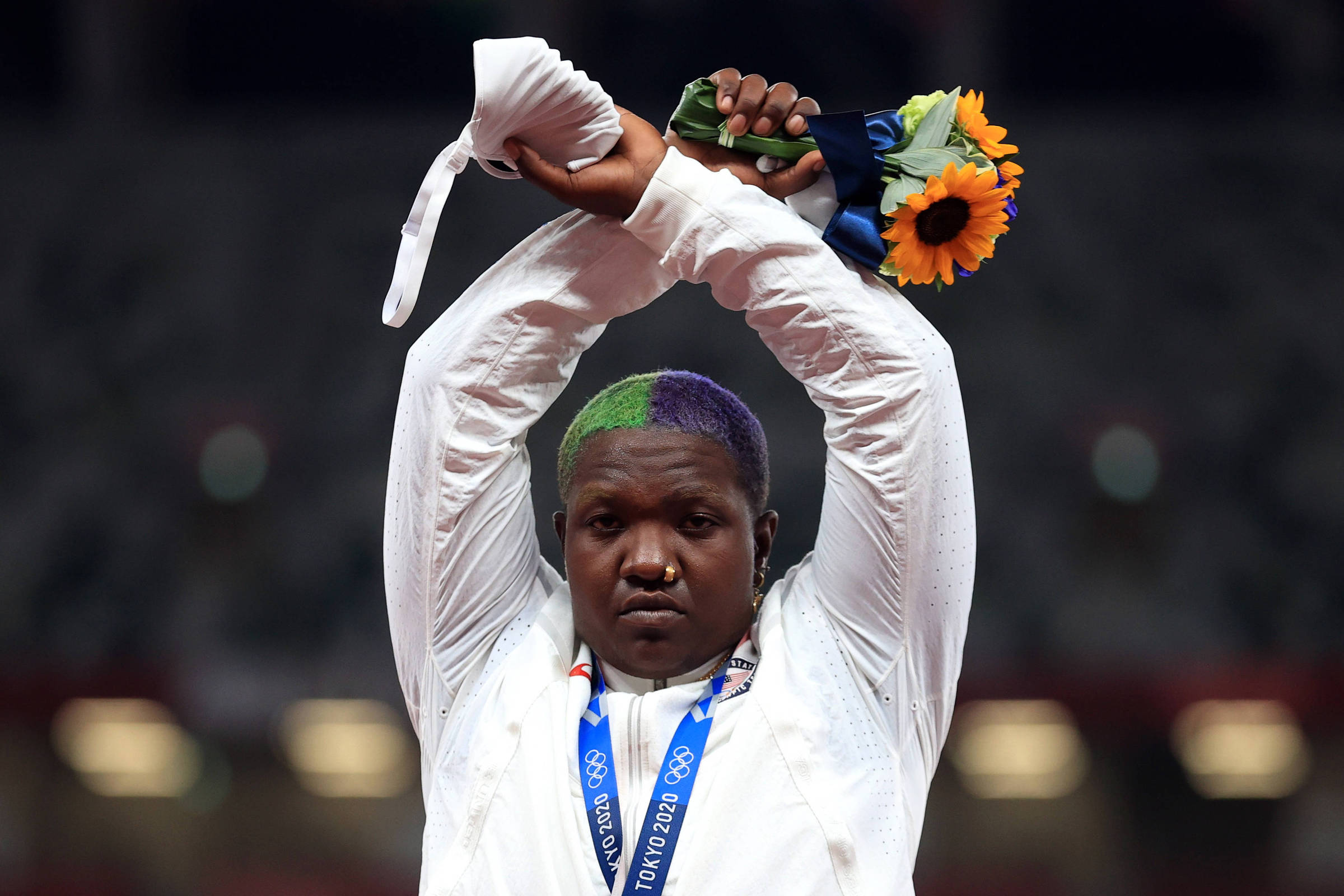Contrary to its history of prosecuting protests, the IOC (International Olympic Committee) has not punished a single athlete for political demonstrations in the stands of the Tokyo 2020 Olympic Games. Two of the gestures received more resonance during the event.
At the podium ceremony in the women’s shot put, 25-year-old American Raven Saunders, who won the silver medal, raised her arms in the form of a cross. In a post-conquest interview, he said the gesture meant “the crossroads where all oppressed people meet.”
Both the USOPC (United States Olympic and Paralympic Committee) and World Athletics (International Athletics Federation) refused to punish the athlete.
The American Committee said that the demonstration that took place after the anthem was performed did not interfere with the medal ceremony and expressed respect for its rivals.
Sebastian Coe, President of World Athletics, said that “the current generation is more willing to speak out than the previous generation.”
The IOC, in turn, refused to pursue the case after it became known that Saunders had lost his mother, Clarissa, 50, just days after winning an Olympic medal.
“The IOC, of course, expresses its condolences to Raven Saunders and her family. Under these circumstances, the process is currently on hold, ”said then-IOC spokesman Mark Adams.
The committee seemed delighted that it had not raised this issue after the tragic event with the prize-winner.
Another case that caused a lot of resonance was with the Chinese Bao Shangjiu and Zhong Tianshi, Olympic champions in the sprint race among the track cycling teams. Athletes used brooches of the dictator Mao Tse-tung, who ruled China from 1949 to 1976, the year of his death.
The use of such emblems at the awards ceremony is also prohibited. The Chinese Olympic Committee sent an explanation to the IOC, which decided not to punish the athletes.
“With regard to China, we received clarifications and the athletes were informed. We also received guarantees that this will not happen again. At this point, the IOC considers the case closed, ”said Christian Claue, director of public relations for the international committee.
Before the Olympic Games, the IOC relaxed rule 50 of the Olympic Charter, which prohibited any political demonstration, but retained its veto power over protests during ceremonies and podiums.
According to the new rule, athletes can prove themselves before the start of the competition, for example, when a team enters the field or court or when their name is announced in arenas, for example, in sports such as athletics and swimming.
Gestures like Saunders on the catwalk, or the use of political emblems like Shanju and Tianshi, remain prohibited.
Another flashy Olympic protest took place in women’s football, as several teams knelt on the lawn, a gesture that became a symbol of the anti-racist struggle in the United States. The demonstration took place in games such as Sweden x USA and UK x Chile. In theory, this attitude remains under the veto of the Olympic Charter.
Australian players carried the Aboriginal flag, red, black and yellow, prior to their debut in women’s football rather than the country’s traditional one. In the 20th century, aborigines were subjected to massacres by English settlers and racism of the Australian population. Today, Aboriginal people make up only 1% of the population. The Australian government has passed compensation laws in an attempt to integrate this population into society.
Tolerance for political demonstrations is a step forward in the restrictive policies that the IOC has followed in the face of these kinds of gestures. Historically, the committee has violently suppressed protests.
At the 1968 Mexico City Games, American black sprinters Tommy Smith and John Carlos raised clenched fists during the ceremony of the 200-meter podium swim… This gesture was a symbol of the Black Panthers, a group that fought racism in the United States. This image is one of the most iconic in the history of the Olympic Games.
At that time, due to strict rules against protests, sprinters were barred from the competition and expelled from the US delegation.
In Munich 1972, a new political gesture on the podium led to a similar punishment. Vincent Matthews and Wayne Collett, 400m champion and runner-up, chatted and laughed as the United States anthem played. Both were deemed “disheveled” for the catwalk awards ceremony. Collette was barefoot and Matthews was unbuttoned.
“I can’t stand on the podium and sing the American National Anthem because I don’t believe what the lyrics say. I wish what he preaches was true, ”Matthews said.
American Avery Brandage, then president of the IOC, considered their behavior disgusting and ordered them to be expelled from the Olympics. Without them, the United States had to withdraw from the 4 x 400m relay, proof that they were very favorites for gold.















